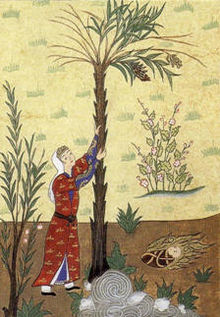Birth
See also: Maryam (sura) and Islamic views of Mary
The Qur'anic account of Jesus begins with a prologue, which describes the birth of his mother, Mary, and her service in the Jerusalem temple, while under the care of the prophet and priest Zechariah, who was to be the father of John the Baptist.[8] The Qur'an then goes on to describe the conception of Jesus. Mary, whom the Qur'an states was chosen by God over the women of all the worlds, conceives Jesus while still a virgin.[edit] Annunciation of the birth of Jesus
Mary had withdrawn into the temple of prayer, where she was visited by the angel Gabriel (Arabic: Jibrail) to give the glad tidings of a holy son.[9] The Qur'an states that God sent the message through the angel Gabriel to Mary that God had honoured Mary among the women of all nations. The angel also told Mary that she will give birth to a holy son, named Jesus, who will be a great prophet, to whom God will give the Gospel. The angel further told Mary that Jesus will speak in infancy and maturity and will be a companion to the most righteous. When this news was given to Mary, she asked the angel how she can to conceive and have a baby when no man has touched her?[10] The reply of the angel to Mary was, " "Even so: Allah createth what He willeth: When He hath decreed a plan, He but saith to it, 'Be,' and it is!".[11] The Qur'an, therefore, states that Jesus was created from the act of God's will. The Qur'an compares this miraculous creation of Jesus with the creation of Adam (Adem), where God created Adam by His act of will (kun-fa-yakun, meaning "Be and it is").[12] According to the Qur'an, the same answer was given to the question of Zechariah, when he asked how his wife, Elizabeth, could conceive a baby as she was very old.[13][edit] Birth of Jesus
The Qur'an narrates the virgin birth of Jesus numerous times. The Qur'an states that, Mary was in the midst of the desert in Bayt Lahm (Bethlehem), when the pains of childbirth came upon her, amidst Mary's agony, God made a small river run under Mary from which she could drink. Furthermore, as she was near a palm tree, Mary was told to shake the trunk of the palm tree so that moist dates would fall down from which she could eat and be nourished. Mary cried in pain and held onto the palm, at which point a voice came from "beneath her", understood by some to refer to Jesus, who was yet in her womb, which said "Be not grieved; God has provided a rivulet under thee; and shake the trunk of the palm and it shall let ripe dates fall upon thee, ready gathered. And eat and drink and calm thy mind". That day, Mary gave birth to her son Jesus while she was in the desert.Forty days later she carried him back to her people. The Qur'an goes onto describe that Mary vowed not to speak to any man on that day, as God was to make Jesus, whom Muslims believe spoke in the cradle, perform his first miracle. The Qur'an goes onto narrate that Mary then brought Jesus to the temple, where immediately she began to be taunted by all the men, excluding Zechariah, who believed in the virgin birth. The Israelites accused Mary of being a loose woman and having touched another man whilst unmarried. In response, Mary pointed to her son, telling them to talk to him. They were angered at this and thought she was mocking them by asking them to speak with an infant. It was then that, God made the infant Jesus speak in the cradle, and he spoke of his prophecy for the first time. He said, which are verses 30-33 in the chapter of Mary in the Qur'an:
"I am a servant of Allah. He will reveal the Book to me and make me a prophet. He blessed me wherever I am. In the rules revealed to me there will be a special attention given to prayers and charity. Allah predestined that I will be kind to my mother and not a tyrant with a bad ending. Peace was on me the day I was born, peace will be on me on the day I will die, and on the day I am raised alive again!"


